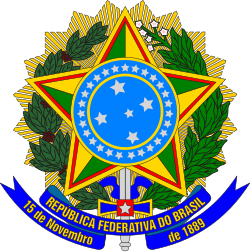| ||||||||||||||||
| ||||||||||||||||
 Results by state | ||||||||||||||||
| ||||||||||||||||
| This article is part of a series on the |
 |
|---|
Presidential elections were held in Brazil on 1 March 1898. [1] The result was a victory for Campos Sales of the Paulista Republican Party, who received 91% of the vote. [2] [3]
| ||||||||||||||||
| ||||||||||||||||
 Results by state | ||||||||||||||||
| ||||||||||||||||
| This article is part of a series on the |
 |
|---|
Presidential elections were held in Brazil on 1 March 1898. [1] The result was a victory for Campos Sales of the Paulista Republican Party, who received 91% of the vote. [2] [3]
| Candidate | Party | Votes | % | |
|---|---|---|---|---|
| Campos Sales | Paulista Republican Party | 420,286 | 90.90 | |
| Lauro Sodré | Paraná Republican Party | 38,929 | 8.42 | |
| Other candidates | 3,146 | 0.68 | ||
| Total | 462,361 | 100.00 | ||
| Source: Nohlen | ||||